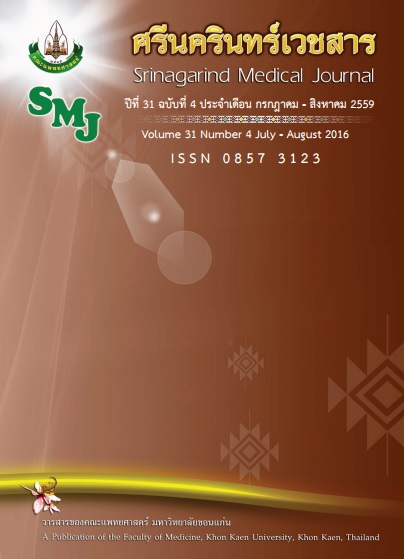CYP1A1 Gene and Risk of Oral Squamous Cell Carcinoma
Keywords:
CYP1A1, Risk, Oral squamous cell carcinomaAbstract
Background and Objectives: Oral cancer remains being the common health problem worldwide. A carcinogen is a main cause of the cancer, susceptibility to oral cancer has been shown to be modulated by inheritance of polymorphic genes. CYP1A1gene encodes smoking-related carcinogen detoxifying enzymes. The aim of this study was to identify the correlation between genetic polymorphism of CYP1A1 m1 and oral squamous cell carcinoma risk and its interactions with smoking as genetic modifiers in the etiology of oral cancer in Northeastern Thailand
Methods : A case-control study was conducted in 79 histologically-confirmed OSCC cases (31 men, 48 women) and 79 age- and sex-matched healthy controls ranging in age 5 years. Genotypic CYP1A1 m1 was detected from buffy coat by using polymerase chain reaction restriction fragment length polymorphism (PCR RFLP). The association between CYP1A1 m1 genotype and risk of oral cancer was analyzed by using logistic regression.
Results : The association between genotype of CYP1A1 m1 and oral squamous cell carcinomarisk was not observed (p > 0.05). In combination with smoking, the association between CYP1A1 m1 polymorphism and increased risk for the oral cancer also was not statistically significant (p > 0.05).However, amongsmokers with CC and CT genotypes showed a trend to increased risk for oral cancer with OR= 4.94 (95%CI = 0.72-34.73) and 2.36 (95%CI = 0.47-11.82); adjusted OR =4.95 (95%CI = 0.70-35.04)and 2.22 (95%CI = 0.43-11.33) by GSTM1 polymorphism, respectively.
Conclusions: Our data suggest that CYP1A1 m1 polymorphism was not associated with the increased risk of oral squamous cell carcinomain Northeastern Thailand. It may play as a co-factor of smoked carcinogen to promote oral cancer development as well as gene-gene interaction. Therefore, investigation of genetic risk factor may be a useful method for screening at high risk of oral cancer.




